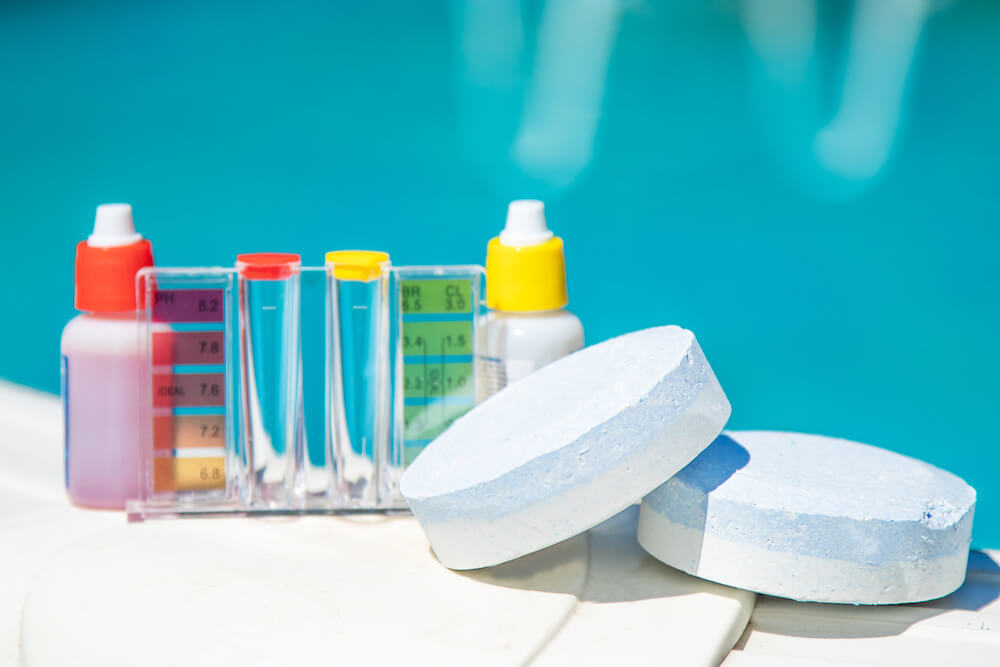Shocking your pool is a crucial aspect of keeping your water clean and sanitized. It also benefits the appearance of the water, making it look clear and pristine. But how frequently do pools need this treatment?
Here’s everything you need to know about shocking and when it’s time to schedule a thorough pool cleaning.
What Is Pool Shocking?
You don’t need to give your pool a jaw-dropping headline to shock it. “Shocking” simply refers to rapidly raising a pool’s chlorine levels.
Shocking your pool eliminates organic contaminants and clears cloudy water. It’s a straightforward, low-effort pool cleaning and maintenance method you’ll want to get accustomed to early on in your pool ownership journey.
Pool experts recommend that you shock your pool weekly, but there are some instances where you may want to do so more often. There are also ideal times to shock your pool as well. Learning about pool shocking best practices is vital to getting the best results.
When to Shock Your Pool
A weekly shock is an excellent habit to get into. However, there are certain instances where shocking your pool is vital. The most critical time is right after you open the pool in the spring or after it’s gone a long time without use.
The lack of use probably means you weren’t shocking as frequently, so bacteria and algae are likely proliferating. Shock the pool to put a stop to it. Do the same if you’re closing down the pool at the end of the season. Shocking it at the end of the summer will make it much easier to clean in the spring.
On the flip side, you should shock your pool if you use it a lot.
Think about everything a person has on them when they enter your pool. Everything from sweat to skin bacteria to makeup can slough off and alter the pool’s chemistry. Chlorine levels also drop dramatically when the pool sees a lot of use. Shocking can help balance the scales.
Climate can also affect how often you shock your pool. Warm, sunny weather can increase your pool’s temperature. The higher the temperature, the faster algae and bacteria will grow, forcing your pool to exhaust its chlorine reserves much faster.
Heavy rains can also introduce contaminants into your pool and disrupt the pH levels. As such, the day after a storm is always a good time for a pool cleaning.
One last situation where you should consider shocking your pool is if you notice a strong chlorine smell or experience eye irritation when you exit the pool.
Adding chlorine when you sense it overwhelmingly sounds counterintuitive, but if your pool reeks of chlorine, it doesn’t usually mean there’s too much in there — instead, it means there’s a buildup of chloramines.
Chloramines are compounds that contain chlorine and ammonia. When inhaled, chloramine fumes can trigger or exacerbate allergy symptoms and even aggravate respiratory issues. They’re not necessarily unsafe, but they’re easy enough to get rid of with a quick pool cleaning.
Helpful Tips for Proper Pool Shocking
If you’re a novice pool shocker and want to get the most out of your weekly pool maintenance, there are some tips you can apply to make sure you’re doing it right.
First, it’s best to shock your pool in the evening after you’ve removed any bits of debris with a skimmer. The sun’s rays can affect the chlorine and cause it to become less effective, so you won’t get much benefit from shocking the first thing in the morning.
Make sure you test your pool water before you add your shock. Your pH should be between 7.2 and 7.4, while the alkalinity levels should read between 100 and 150 parts per million. While this reading is slightly lower than what you want to shoot for, a pool with these levels will often react better to shocking treatments.
Also, remember to add shock to your water, not the other way around. Distribute it evenly throughout the pool by walking around as you pour. Always pour close to the water’s surface and move upwind to prevent the powder from blowing into your face.
Once you’re done, you’ll want to wait to use your pool until the shock has done its job. Double-check the manufacturer’s instructions to avoid irritating your skin or eyes.
Professional Pool Cleaning Done Right
For crystal-clear, inviting water, nothing beats a cleaning performed by a professional pool company. Through routine cleanings and preventive maintenance, pool cleaners can help keep your pool safe and healthy so you can be at ease whenever you take a dip.





